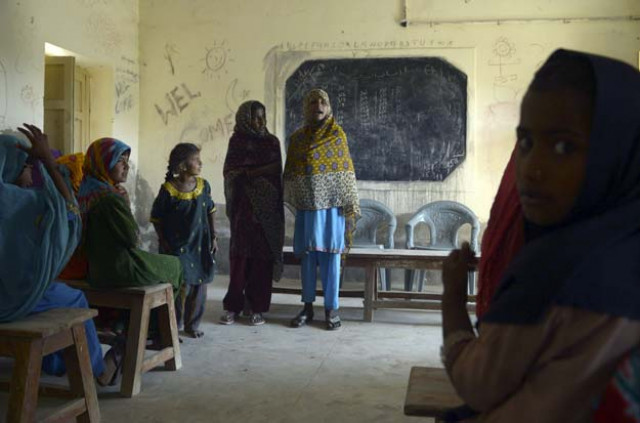How governments spend their money
Budget-makers don’t look at the state of the nation and its harsh realities

Last Friday, the government announced that 2.2% of Pakistan’s 2015-16 budget would be spent on the education sector. PHOTO: AFP
Her people – all 190 million of them. Her people are the ones who teach her generations to come. They are the ones who toil in the sun to harvest crops from her burdened soil. They are the ones who channel her riches from beneath the earth’s surface. They are the workers who make the wheels of factories spin. They are the industrialists who gin and spin her abundant agricultural wealth into GDP. They are the navigators and drivers of its economic engines. They are the ones who protect her sovereignty and borders.
By far, the best resource of a nation is her human resource – without which her other assets also become endangered.
But what makes her people? Education – to begin with.
Education: the very weave of our national fabric
Last Friday, the government announced that 2.2% of Pakistan’s 2015-16 budget would be spent on the education sector (the terminology itself reflects that education too is akin to an industry now). That’s Rs98 billion out of Rs4.5 trillion, a 13% increase from last year’s Rs86 billion.
Next year, the government plans to increase education spending to 3% of GDP, from last year’s 1.8%.
Global context: other nations’ priorities
How does this place us among other nations?
According to an article by Daniel Wesley in Visual Economics, in 2013, Thailand seems to have allocated the most: 28.3% of its budget for education. Morocco spends 26.4% of its budget on education.
For our neighbours across the pond, in the United Arab Emirates, education spending is 22.5% of the country’s annual budget. Iran spends 17.7% on education and the United States follows closely with 17.1%. The UK and Russia both spend 11.5% and Japan 10.5%.
Two years later, one hopes their education spending trend would be a positive one. In any case, Pakistan doesn’t seem to fare too well.
Numbers don’t lie
In our country, the absolute figures are absolutely appalling. In his benevolence, the prime minister has allocated Rs24 million for his merit scholarship programme – that’s not even 2.5% of the budget for just the PM House expenditures, Rs1 billion. His office though runs a tiny bit more austerely, at a separate budget of Rs842 million.
Oh the promises of youth
Among Pakistan’s leading assets is its youthful population. An estimated 54.8% of Pakistanis are under the age of 24 years, a total of 99.7 million children in the country (Mundi 2014). Of these, 33.3% are under the age of 14. Without a reasonable education, the future of both – these children and their motherland – looks bleak.
Less than Rs1,000 per child
This education sector budget is for all development and non-development projects.
Even if we were to wish and hope that every paisa of this budget is spent on the nation’s children, it’d be only Rs983 per educational-age Pakistani for the whole year.
That’s not accounting for the ‘many a slip between the cup and the lip’: corruption. Nor the money likely spent on brick and mortar.
And the people who make these budgets still stand tall. They don’t look at the state of their nation, its harsh realities and find themselves culpable, as her leaders. They seem to be unmoved by their inability to account for the authorities vested in them: to the nation, to their positions and to God, in whose name this nation was built.
It’s not surprising though that they would or that the government would evaluate education such. After all, in spite of proven fake degrees, over four dozen parliament members unabashedly cling to their seats – the very seats that hold them to higher standards of accountability.
It’s a full circle – and not a very long one either.
All budget-related figures are from The Express Tribune, Saturday June 6, 2015 edition
The writer is a sustainability consultant that began her career as a business journalist, publishing over 200 articles to date
Published in The Express Tribune, June 8th, 2015.
Like Business on Facebook, follow @TribuneBiz on Twitter to stay informed and join in the conversation.


















COMMENTS
Comments are moderated and generally will be posted if they are on-topic and not abusive.
For more information, please see our Comments FAQ